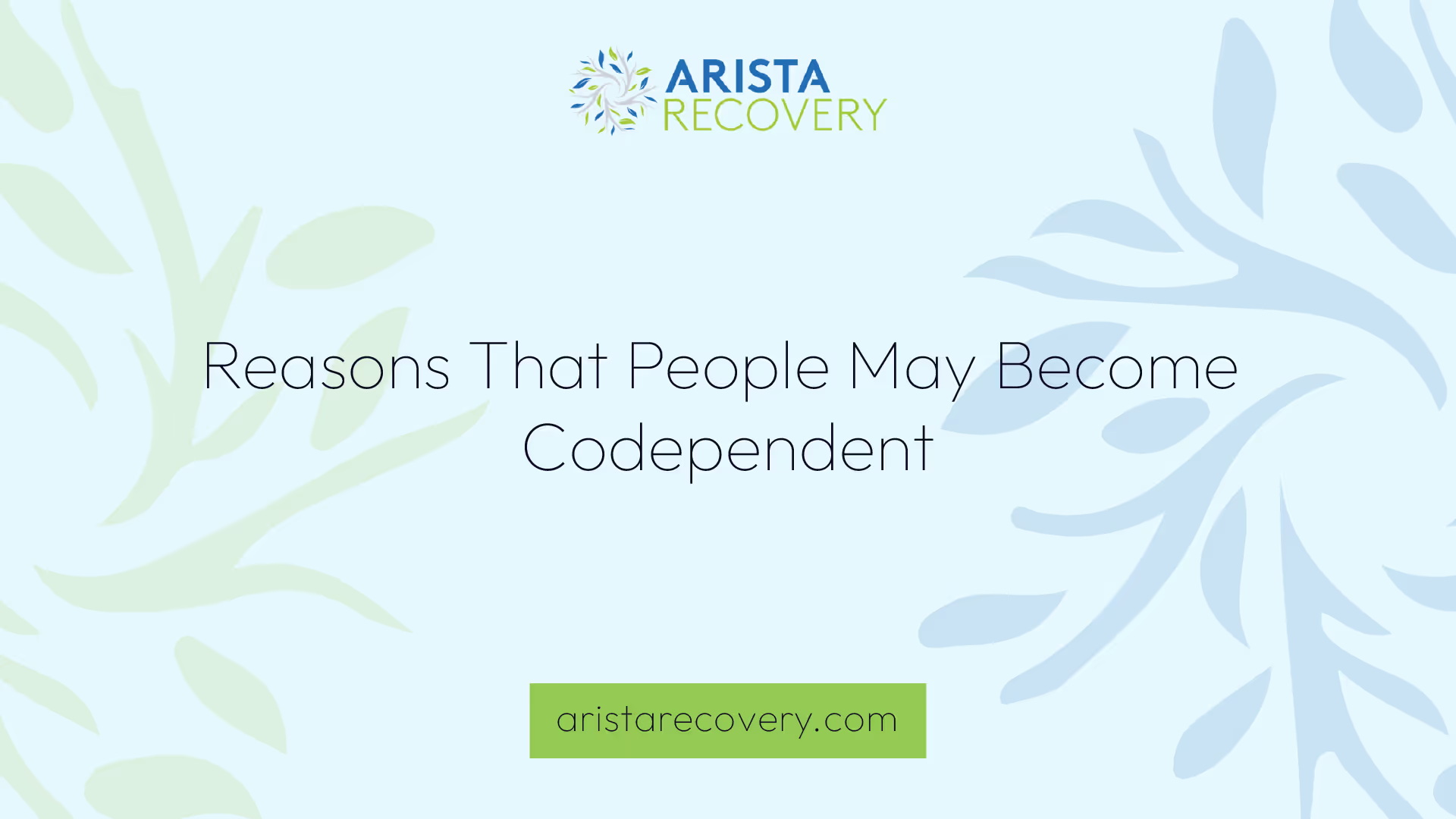Reasons That People May Become Codependent

Understanding Codependency
In order to understand the reasons that people may become codependent, it is first necessary to define codependency and explore its characteristics and impact on relationships.

Definition and Characteristics
Codependency is a behavioral pattern that inhibits an individual from being part of a healthy, two-sided relationship. Instead, those struggling with codependency often forsake their own mental health and needs to prioritize someone else's. This pattern can manifest in various relationships, including romantic, friendships, colleagues, and family members.
Characteristics of codependency include caretaking, denial and avoidance, anger, controlling behavior, as well as enabling or rescuing tendencies. Codependent individuals may have difficulty expressing their own needs and feelings, setting boundaries with others, and often find themselves in relationships with people who are needy, dependent, or have addiction issues.
Impact on Relationships
Codependency can be damaging to both the codependent individual and the people they're in relationships with. Codependent individuals often struggle with interpersonal boundaries, self-esteem, and self-worth, leading to difficulties in relationships. This emphasizes the importance of seeking professional help for treatment.
The impact of codependency on relationships can be profound, affecting intimacy, trust, and communication. In a codependent relationship, one person may become overly reliant on the other for their emotional needs, while the other person may feel an excessive responsibility to meet those needs, often at the expense of their own well-being. This unhealthy dynamic can lead to resentment, conflict, and emotional distress for both parties involved.
Understanding the definition, characteristics, and impact of codependency is the first step in addressing this issue. Recognizing these patterns can help individuals seek the necessary help and treatment to overcome codependency and establish healthier relationships.
Causes of Codependency
Codependency is a complex psychological condition that arises from a variety of factors. To understand the reasons that people may become codependent, it is important to explore childhood experiences, unhealthy attachments, and family dynamics.
Childhood Trauma
Childhood trauma is one of the primary causes of codependency. Individuals who have experienced any form of childhood trauma may develop codependent behaviors as a coping mechanism. This happens when individuals prioritize others' needs over their own due to unmet childhood needs and a sense of insecurity carried into adulthood.
Studies have shown a correlation between childhood abuse and codependency in adulthood, indicating a strong link between past trauma and codependent behaviors. While some individuals may develop resiliency following trauma, others may struggle with developing a stable sense of self, which can contribute to feelings of insecurity and codependency in later life [3].
Unhealthy Attachments
Another factor contributing to codependency is the development of unhealthy attachments, often as a response to trauma. This can result in trauma bonding, where individuals may feel compelled to stay with someone who may hurt them, due to a distorted sense of responsibility to "fix" the other person [3].
Unhealthy attachments such as these can lead to a cycle of codependency, as individuals may continually seek out relationships with individuals who are emotionally unavailable or abusive, perpetuating the cycle of codependency.
Family Dynamics
Codependency can also be a learned behavior, often passed down from one generation to the next. Children who grow up in families where codependency is prevalent may learn to imitate these behaviors and carry them into their own relationships. For example, a child who watches a parent in a codependent relationship may repeat the pattern in their own relationships later in life [4].
The family environment plays a significant role in the development of codependent behaviors. Children raised in families with a high degree of dysfunction, such as those with substance abuse issues or mental health disorders, are at a higher risk of developing codependency.
Recognizing these factors is the first step towards understanding and addressing codependency. It is important to remember that codependency is a response to trauma and dysfunction, and not a character flaw. With the right support and treatment, it is possible to overcome codependency and develop healthier ways of relating to others.
Effects of Codependency
Codependency can have profound effects on an individual's life, impacting them emotionally, behaviorally, and psychologically. If left unchecked, it can lead to significant difficulties, including substance disorders, eating disorders, and other compulsive behaviors. Let's explore these impacts further.
Emotional Consequences
Codependency often results in a plethora of emotional complications. Codependents may end up neglecting their own emotional needs in their efforts to cater to those of others. This self-neglect can lead to feelings of resentment, frustration, and emotional exhaustion.
One of the most common emotional consequences of codependency is a pervasive sense of guilt for not fulfilling others' requests. Codependents often struggle with setting boundaries and saying "no" when needed, which can lead to emotional turmoil and stress.
Behavioral Patterns
Codependency leads to a pattern of behaviors that prevent a person from being part of healthy, two-sided relationships. Codependents often forsake their own mental health and needs to prioritize someone else's. This behavior pattern can manifest in various relationships, including romantic, friendships, colleagues, and family members.
These patterns can also lead to physical problems due to poor self-care. Codependents may neglect their own health and wellness to focus on the needs of others. This can lead to unhealthy habits, including substance abuse, overeating, or other compulsive behaviors.
Psychological Impact
The psychological impact of codependency can be far-reaching. Codependents often carry a sense of insecurity and unmet needs from their childhood into adulthood. This can result in a deeply ingrained belief that their value is derived from the approval and validation of others.
This mindset can lead to substantial losses, missed opportunities, and hindered personal goal achievement. It can also impact occupational and social functioning, as codependents may struggle to maintain healthy relationships and boundaries in their professional and personal lives.
The psychological impact of codependency emphasizes the importance of seeking professional help for treatment. With appropriate support, it is possible to break free from the cycle of codependency and cultivate healthier relationships.
Treatment Options
When it comes to addressing codependency, there are a variety of therapy options available that can help individuals understand and overcome their tendencies towards codependency. It's important to understand that the reasons that people may become codependent are often complex and multifaceted, requiring a tailored approach to treatment.
Cognitive Behavioral Therapy (CBT)
Cognitive behavioral therapy (CBT) is a well-regarded codependency counseling modality that helps individuals recognize codependent patterns in their behavior. Through CBT, individuals are taught to develop problem-solving skills, learn to spend time alone, understand that they can't change others, and build confidence.
CBT is effective in treating codependency because it targets and changes negative thought patterns that lead to codependent behavior. By learning to identify these patterns, individuals can begin to change their behaviors and break the cycle of codependency.
Family Therapy
Family therapy is another beneficial treatment option for addressing codependency, especially when it is a learned behavior passed down through generations. This type of therapy helps individuals better relate to and understand family members' emotions, behaviors, and problems, with the aim of ending dysfunctional family dynamics [1].
Family therapy provides a platform for families to communicate openly about their issues, understand each other's perspectives, and work together to find solutions. This can be particularly useful in cases where codependency is rooted in family relationships.
Group Therapy
Group therapy provides individuals in codependent relationships with a platform to speak up, build confidence, and hear diverse perspectives. This can aid in the process of healing and growth through shared learning and increased accountability.
Group therapy sessions often include individuals who are dealing with similar issues, providing a supportive environment in which individuals can share their experiences and learn from each other. This sense of community can be beneficial in helping individuals overcome feelings of isolation and build a network of support.
In conclusion, there are several effective treatment options available for individuals dealing with codependency. Whether it's through cognitive behavioral therapy, family therapy, or group therapy, individuals can learn to understand their codependent tendencies and develop strategies to overcome them. Remember, it's important to seek help from a mental health professional if you or someone you know is struggling with codependency. With the right support and treatment, it's possible to break free from codependency and lead a healthier, more fulfilling life.
Overcoming Codependency
While understanding the reasons that people may become codependent is crucial, it's equally important to highlight the strategies and practices that can help individuals overcome codependency. This process often involves setting healthy boundaries, implementing self-care practices, and building self-esteem. These steps can help individuals navigate their relationships more healthily and assert their needs and desires.
Setting Healthy Boundaries
Setting healthy boundaries is an essential step in overcoming codependency. Boundaries allow individuals to communicate their needs and limits effectively. Moreover, they enable individuals to practice saying "no" when necessary and prioritize their self-care needs. By doing so, they can create and maintain healthier partnerships and prevent themselves from sacrificing their mental health and needs for others. This is an important step in breaking the pattern of behaviors that prevent a person from being part of a healthy, two-sided relationship.
Self-Care Practices
Self-care practices are also crucial in overcoming codependency. This can include a variety of activities, such as taking time for relaxation, engaging in physical activity, seeking therapeutic support, and investing time in hobbies and interests. Self-care practices can also involve spending time alone, asking for what one needs, and understanding that they can't change others. Cognitive behavioral therapy (CBT) is a well-regarded codependency counseling modality that helps individuals recognize codependent patterns, develop problem-solving skills, and build confidence.
Building Self-Esteem
Building self-esteem is another important step in overcoming codependency. High self-esteem can help individuals assert their needs and desires in relationships, rather than forsaking their own needs to prioritize someone else's. This can be achieved through various therapeutic approaches, including individual therapy, family therapy, and group therapy.
Family therapy is particularly beneficial for addressing codependency, especially when it is a learned behavior passed down through generations. It helps individuals better relate to and understand family members' emotions, behaviors, and problems, aiming to end dysfunctional family dynamics.
Group therapy provides individuals in codependent relationships with a platform to speak up, build confidence, and hear diverse perspectives. This aids in the process of healing and growth through shared learning and increased accountability [1].
In conclusion, overcoming codependency is a journey that requires commitment, effort, and patience. By setting healthy boundaries, prioritizing self-care, and building self-esteem, individuals can break the cycle of codependency and foster healthier and more fulfilling relationships.
References
[1]: https://www.charliehealth.com/post/therapy-for-codependency
[2]: https://www.nextlevelrecoveryassociates.com/blog-posts/codependency-and-the-need-to-create-boundaries
[3]: https://psychcentral.com/lib/trauma-and-codependency
[4]: https://www.verywellmind.com/what-s-the-best-codependency-treatment-5070487
[5]: https://www.recoveryranch.com/addiction-blog/trauma-and-co-dependency/
[6]: https://mentalhealthmatch.com/articles/recovery/17-characteristics-of-a-codependent-person
You’re not alone in this.
When mental health challenges and addiction intersect, it can feel isolating. At Arista, we offer compassionate, evidence-based, and trauma-informed care to help you heal, grow, and move forward.
You’re not alone in this.
When mental health challenges and addiction intersect, it can feel isolating. At Arista, we offer compassionate, evidence-based, and trauma-informed care to help you heal, grow, and move forward.
Support that moves with you.
You’ve taken a brave first step. At Arista Recovery, we’re here to help you continue with best-in-class care designed for long-term healing and support.
.webp)






